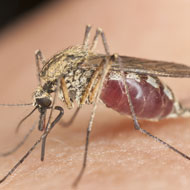Malaria 'superbug' spreads across South East Asia

The spread of this malaria “superbug” has caused an alarming rise in treatment failures.
Scientists have raised serious concern over a highly drug-resistant malaria ‘superbug’ that is spreading across South East Asia.
In a letter published in The Lancet Infectious Diseases, researchers say the spread of Plasmodium falciparum (p.falciparum) in the greater Mekon subregion ‘presents one of the greatest threats to the control and elimination of Malaria’.
They add that the ‘superbug’, which originated in Cambodia, is now present in southern Vietnam, leading to alarming failure rates of dihydroartemisinin-piperaquine - Vietnam’s national first-line treatment.
“A single mutant strain of this very drug-resistant malaria has now spread from western Cambodia to north-eastern Thailand, southern Laos and into the southern Vietnam and caused a large increase in treatment failure of patients with malaria,” explained co-author Prof. Arjen Dondorp, head of malaria and deputy head of the Mahidol Oxford Tropical Medicine Research Unit (MORU) in Thailand, Asia.
“This could result in an important increase in malaria transmission in these countries and several jeopardise their malaria elimination efforts,” he continued. “We hope this evidence will be used to re-emphasize the urgency of malaria elimination in the Mekon sub-region before falciparum maria becomes close to untreatable.”
The evolution and subsequent transnational spread of this single fit multidrug-resistant malaria parasite is of international concern, the researchers write in the letter.
“We are losing a dangerous race. The spread of this malaria “superbug” has caused an alarming rise in treatment failures forcing changes in drug policy and leaving few options for the future,” said letter co-author and Mahidol and Oxford University Prof, Sir Nicholas White. “We need to tackle this public health emergency urgently.”
Michael Chew from Wellcome's Infection and Immunobiology team added: "The spread of this malaria "superbug" strain, resistant to the most effective drug we have, is alarming and has major implications for public health globally.
“Around 700,000 people a year die from drug-resistant infections, including malaria. If nothing is done, this could increase to millions of people every year by 2050. Efforts to help track resistance to drugs are vital for improving diagnosis, treatment, and control of drug-resistant infections."



 FIVP has shared a survey, inviting those working in independent practice to share their views on the CMA's proposed remedies.
FIVP has shared a survey, inviting those working in independent practice to share their views on the CMA's proposed remedies.